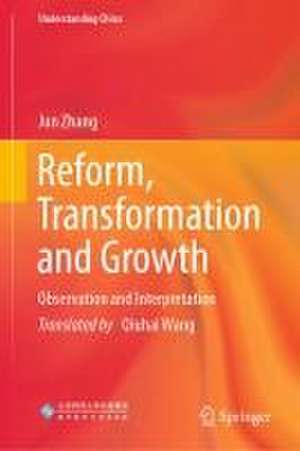Reform, Transformation and Growth: Observation and Interpretation: Understanding China
Autor Jun Zhang Traducere de Qiuhai Wangen Limba Engleză Hardback – 10 sep 2024
Din seria Understanding China
- 18%
 Preț: 734.27 lei
Preț: 734.27 lei - 18%
 Preț: 732.07 lei
Preț: 732.07 lei - 18%
 Preț: 886.92 lei
Preț: 886.92 lei - 15%
 Preț: 694.69 lei
Preț: 694.69 lei - 15%
 Preț: 636.63 lei
Preț: 636.63 lei - 15%
 Preț: 703.85 lei
Preț: 703.85 lei - 18%
 Preț: 887.55 lei
Preț: 887.55 lei - 15%
 Preț: 646.30 lei
Preț: 646.30 lei -
 Preț: 387.75 lei
Preț: 387.75 lei - 18%
 Preț: 897.02 lei
Preț: 897.02 lei -
 Preț: 389.70 lei
Preț: 389.70 lei - 18%
 Preț: 952.40 lei
Preț: 952.40 lei - 18%
 Preț: 954.45 lei
Preț: 954.45 lei - 18%
 Preț: 787.91 lei
Preț: 787.91 lei - 15%
 Preț: 694.55 lei
Preț: 694.55 lei - 15%
 Preț: 637.13 lei
Preț: 637.13 lei - 18%
 Preț: 898.13 lei
Preț: 898.13 lei - 18%
 Preț: 738.06 lei
Preț: 738.06 lei - 18%
 Preț: 781.00 lei
Preț: 781.00 lei -
 Preț: 394.51 lei
Preț: 394.51 lei - 15%
 Preț: 650.69 lei
Preț: 650.69 lei - 18%
 Preț: 794.07 lei
Preț: 794.07 lei - 15%
 Preț: 644.49 lei
Preț: 644.49 lei - 15%
 Preț: 646.75 lei
Preț: 646.75 lei - 18%
 Preț: 946.10 lei
Preț: 946.10 lei - 18%
 Preț: 797.41 lei
Preț: 797.41 lei - 18%
 Preț: 1217.27 lei
Preț: 1217.27 lei - 15%
 Preț: 642.03 lei
Preț: 642.03 lei - 15%
 Preț: 641.85 lei
Preț: 641.85 lei - 18%
 Preț: 1249.63 lei
Preț: 1249.63 lei - 15%
 Preț: 642.83 lei
Preț: 642.83 lei -
 Preț: 388.52 lei
Preț: 388.52 lei
Preț: 792.19 lei
Preț vechi: 966.08 lei
-18% Nou
Puncte Express: 1188
Preț estimativ în valută:
151.60€ • 164.62$ • 127.35£
151.60€ • 164.62$ • 127.35£
Carte tipărită la comandă
Livrare economică 22 aprilie-06 mai
Preluare comenzi: 021 569.72.76
Specificații
ISBN-13: 9789819957118
ISBN-10: 9819957117
Ilustrații: XVIII, 382 p. 56 illus., 1 illus. in color.
Dimensiuni: 155 x 235 mm
Greutate: 0.74 kg
Ediția:1st ed. 2024
Editura: Springer Nature Singapore
Colecția Springer
Seria Understanding China
Locul publicării:Singapore, Singapore
ISBN-10: 9819957117
Ilustrații: XVIII, 382 p. 56 illus., 1 illus. in color.
Dimensiuni: 155 x 235 mm
Greutate: 0.74 kg
Ediția:1st ed. 2024
Editura: Springer Nature Singapore
Colecția Springer
Seria Understanding China
Locul publicării:Singapore, Singapore
Cuprins
Chapter 1. Information Costs, Limited Reasoning Ability and Simplifying Planning: A Theoretical Explanation of Traditional Chinese Planning.- Chapter 2. Socialist Government and Enterprise: An Analysis from the Perspective of “Exit.- Chapter 3. Monetary Incentive and Property Rights Structure of Socialist Enterprises: China's Experience.- Chapter 4. Privileges Sustained by Central Planning: An Analytical Method of Property Rights.- Chapter 5. The Growth of China's Industrial Output Since the Reform: Double-Track Pricing and Border Competition.- Chapter 6. Technology, Classification of Scale and Industrial Organization: Why Can China's “Large Enterprises” Make Higher Profit Margins?.- Chapter 7.Industrial Reform and Efficiency Change in China: Methods, Data, Literatures and Existing Results.- Chapter 8. Decline of China's Investment Efficiency and the Aggregate Characteristics of Capital Formation.- Chapter 9. Growth, Capital Formation and Technological Choice: Explanation of Long-Term Factors for Recent Decline of Economic Growth in China.- Chapter 10. Decentralization and Growth: The Story of China.- Chapter 11. Why Have China Had A Good Infrastructure: Decentralization Competition, Governance and Infrastructure Investment Decisions.- Chapter 12. Irregular Financial Sector in Rural China after the Reform: A Case Study of Wenzhou.- Postscript.
Notă biografică
Jun Zhang is a Chinese economist and currently serves as Dean of School of Economics at Fudan University in Shanghai.
Jun Zhang is the founding Director of the China Center for Economic Studies(CCES), a Shanghai-based Think-Tank for Chinese economy. He is also a member of special advisory committee to Shanghai Municipal Government. In July 2015, he was one of the three economists selected for face-to-face dialogue with Premier Li Keqiang in Beijing. Jun Zhang also publishes widely. Recent contributions have been to The World Economy, China Economic Review, Economic Systems, Comparative Economic Studies, Journal of Asian Economics, Journal of the Asia Pacific Economy, Journal of Chinese Economic and Business Studies, etc. In January 2018, he was rewarded the Bergson Prize by the American Association for Comparative Economic Studies(ACES) for his paper published in Comparative Economic Studies in 2015. Also in 2015, along with Justin Yifu Lin and Fan Gang, he was awarded the Prize of China Economics Innovation. Over the past 25 years he has authored or edited numerous books including Economic Transition with Chinese Characteristics: Thirty Years of Reform and Opening Up (McGill-Queen University Press, 2008), Transformation of the Chinese Enterprises (Cengage Learning, 2009), Unfinished Reforms of the Chinese Economy (World Scientific Publishing Ltd., 2013), and End of Hyper Growth In China(Palgrave Macmillan, 2016). He has been on the editorial board of about 25 academic journals including Economic Systems, Journal of the Asia Pacific Economy, East Asia Policy, Journal of Pro-Poor Economics, China Social Sciences Review, China Economic Quarterly, China Economic Journal, China: An International Journal, and editor-in-chief of Fudan Economic Papers.
Textul de pe ultima copertă
This book aims to present the observation and Interpretation for China’s economic growth since Reform and Opening-up from a Chinese economist’s view. The book is divided into 5 sections, including the research of traditional socialist economic structure, China’s transformation from planned economy to market economy, reform of Chinese industrial economy, economic growth and political economy. Key topics are covered over the past 40 years including strategies for economic transformation, dual-track pricing, industrial transformation and enterprise reform, capital formation and economic growth, structural changes and productivity growth, macroeconomics, fiscal relations between central and local governments, and the political economy of growth.
Caracteristici
Is authored by Chinese distinguished economist Jun Zhang Analyzes the impact of China's industrial reform on productivity and profitability of the enterprises Studies the mode of the transformation of Chinese economic system and mechanism of enterprise privatization
